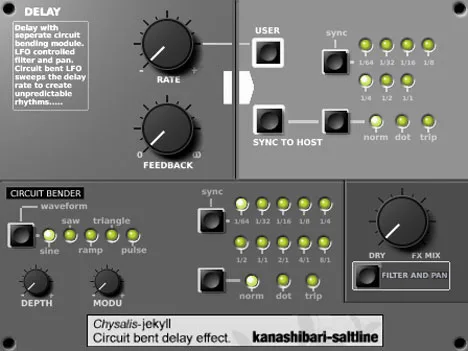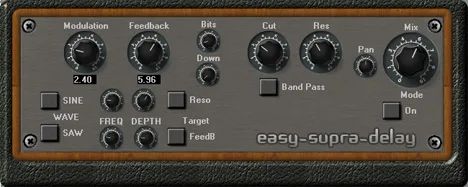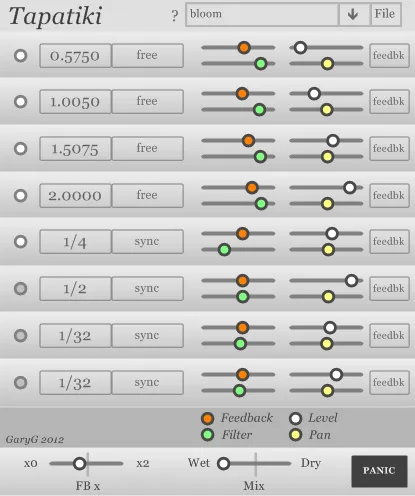Jekyll by Saltline: When Delay Comes Alive Unpredictably
Looking for a delay effect that goes beyond the ordinary? Need a tool to create unique soundscapes, glitch effects, and experimental textures? Meet Jekyll by Saltline – a delay plugin inspired by the concept of circuit bending, bringing unpredictability and character to your sound.
Circuit bending is the art of intentionally short-circuiting low-voltage electronic devices (such as children’s toys, small synthesizers, digital recorders) to create new, often chaotic or musical sound effects. The Jekyll plugin mimics this philosophy by applying it to the delay effect, allowing you to manipulate parameters in ways that go beyond standard signal processing.
Features That Shape Character
Jekyll isn’t just a standard delay. Its strength lies in the interaction of the classic effect with powerful modulation capabilities and a unique filter. Let’s take a closer look:
Flexible Delay
- Free tempo or host synchronization: You can set the delay time in milliseconds for precise control or synchronize it with the tempo of your project in a DAW. This allows you to create both classic rhythmic echoes and completely free, ambient repeats.
Self-Oscillating State Variable Filter
- This filter adds a unique timbral coloring to the delay repeats. State Variable filters are known for their versatility, allowing you to smoothly transition between Low-Pass, Band-Pass, and High-Pass modes.
- Self-oscillation: At high resonance, the filter can generate its own tone (pitch). This opens up possibilities for creating unexpected sounds, adding subharmonics, or using the filter as an experimental sound source that interacts with the delay. You can “play” with the resonance, creating ringing or buzzing effects on the repeats.
Simple Stereo Panning
- Built-in tool for controlling the stereo position of the delay. This allows you to expand the sound space by placing repeats at different points in the panorama.
Powerful Modulation with LFOs
- Three independent LFOs (Low-Frequency Oscillators): This is the heart of the “circuit bent” functionality of Jekyll. LFOs generate slow cyclical changes that can be used to modulate other plugin parameters.
- Synchronization of LFOs with the host: You can synchronize the modulation speed with the tempo of your project, creating complex but synchronized rhythmic modulation patterns.
- Five different waveforms: Choose between sine, triangle, saw, rectangle, and random waveforms to get different types of modulation movement – from smooth and organic to sharp and unpredictable.
- Wide range of LFO speed: From extremely slow cycles (up to 84 bars) to very fast (8 cycles per bar). This allows you to create both subtle changes and fast, glitch-like effects.
- LFO assignments:
- One LFO controls the delay speed (this is a key element of the “circuit bending” effect, creating pitch and stutter changes).
- One LFO controls the filter (adds movement and evolution to the timbre of the repeats).
- One LFO controls panning (creates moving stereo effects).
Creative Possibilities
The interaction between the delay, filter, and flexible LFOs opens up many possibilities for sound design:
- Creating “melted” or “deformed” delay repeats with floating pitch.
- Generating rhythmic stutters and glitches synchronized with the tempo.
- Adding filtered movement to echoes that evolve over time.
- Creating wide, moving stereo panoramas for repeats.
- Using a self-oscillating filter to add resonant tones or noises to the delay.
- Getting a unique, unpredictable character that is difficult to achieve with traditional effects.
Jekyll is a plugin for those who are not afraid to experiment and are looking for new sounds. It’s great for processing vocals, synthesizers, guitars, drums, or any other source you want to give a unique, slightly crazy character to.
Conclusion
Saltline Jekyll offers a fresh perspective on the delay effect, combining classic functionality with unusual modulation possibilities, inspired by circuit bending. Its intuitive interface hides a depth of possibilities for creative sound design. If you’re ready to add a bit of chaos and uniqueness to your mixes, Jekyll is definitely worth your attention.



